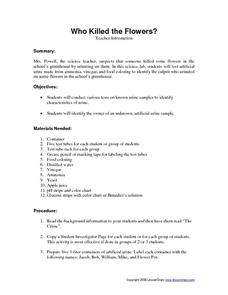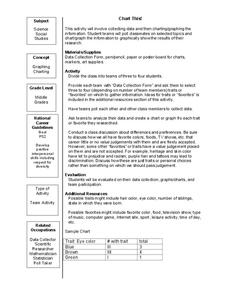Curated OER
Shake, Rattle and Roll
Learners compare the weathering of different-sized materials. Comparisons are made and data analyzed to reach conclusions about the process of weathering. Applications can be made for the higher grades.
Curated OER
Let's Take a Rock Apart
Students take a crushed rock and sort the remains of the rock minerals into different categories based on the different properties. In this sorting lesson plan, students learn what makes up a rock and how to sort something into categories.
Curated OER
Shake, Rattle and Roll
Students compare the weathering of materials. in this weathering lesson, students experiment with the chemical and physical weathering of different materials. Students use salt and water as an example of how weathering occurs.
Lesson Snips
Who Killed the Flowers?
This could be really good, or it could be really bad! The crime to be solved is, "Who went pee in the flowerpot?" Given four imitation urine samples, young chemists or crime scene investigators perform pH, glucose, and turbidity...
Curated OER
Conventions: Adjectives
Investigate adjectives with writers. They define adjectives and create their own sentences describing objects found at home using adjectives correctly. Focus on the five senses and sensory details.
ESL Kid Stuff
Intro ESL Lesson (Ages 8-14)
Introduce language learners to class behavior expectations, and each other, with activities that include greeting and name games, conducting a class survey, and creating a classroom rules poster.
Curated OER
Express Yourself
First graders identify details that make reading and writing more interesting. They classify events, people, places, and things and attach specific characteristics to each one. Everyone generates describing words on a worksheet that's...
Curated OER
Flower Power
Determine which plants are flowering plants with a helpful lab sheet. Kids first observe illustrations of different plants, such as a carnation and a fern, then decide which plants produce flowers, spores, or cones. Use magazine pictures...
It's About Time
Identifying Matter
High schoolers test wood splints that have been soaked in mystery solutions to identify the different colors it produces when lit. The lesson concludes with a reading passage and analysis questions.
NOAA
Motion from the Ocean
Create a fish mobile using cardboard and string to hang in the classroom while studying ocean life. Each printable requires pupils to cut out two of the same fish to create consistency on the front and back.
Curated OER
What Can I Do?
Students understand situations that cause different feelings. In this conflict resolution instructional activity, students read a story and complete an e-sheet about making good choices during conflict. Students to discuss the choices in...
Curated OER
Are You Aware?
Bring the five senses to life with a fun science experiment! Kindergartners and first graders read an explanation of the five senses, then identify which items Sophia can sense if she is blindfolded. A science explanation at the bottom...
Curated OER
Name That Leaf
Take a walk through nature with a science experiment about leaves. Third graders use a branching diagram to group attributes of certain kinds of leaves, such as oak, pine, and chestnut. For extra practice, they can collect leaves and...
Curated OER
Build a Coral Polyp
Young scholars build a coral polyp out of a banana, straw, oyster crackers, sprinkles, and more. In this coral polyp lesson plan, students also list the differences between plants and animals.
Desert Discoveries
Sonoran Desert ABC's
Third graders make alphabet cards that depict the wide variety of life forms found in the Sonoran Desert. A terrific lesson that combines language arts, visual arts, and life science all into one wonderful package. Each of the cards has...
Howard Hughes Medical Institute
Stickleback Evolution Virtual Lab
How quickly do animals evolve? Can comparing different samples of the same fossil answer timeline questions? Scholars use virtual labs to examine fossils and learn about stickleback evolution. They compare pelvic morphology in lakes...
Curated OER
Life Comes in Cycles
Kids are fascinated by chickens and their eggs. Here is a learning exercise has young learners take a look at the four stages in a chicken's life cycle. They have four cycles to organize: egg, chick, young bird, and adult. They have to...
Curated OER
Know your roots!
Looking at an image of plant systems with their roots in the ground, learners determine which would be the most or least difficult to pull. They write short sentences describing which plant they chose and why. Intended for 3rd or 4th...
Curated OER
The Beluga Whale, Otters
In these internet activity worksheets, students complete research related to the Beluga Whale and otters. Student are able to answer questions by following directions to help them navigate around a website.
Curated OER
Making Felt Bags
Pupils study the history of bags, pouches and purses. Use of these items spans the entire globe and encompasses practically every civilization. The lesson culminates with learners creating their own bag from a variety of choices. The...
Curated OER
Coral Polyp Party
Learners complete a project where they label the parts of a coral polyp and discuss the differences between plants and animals. Students use marshmallows, sprinkles, toothpicks, and more to label their coral polyp.
Curated OER
Name that animal
A great way to classify organisms, is by counting the number of legs it has or how it moves. Little ones count the legs on five different creatures, then match the leg count to the proper animal name. Tip: Have them come up with other...
Curated OER
Chart This!
Students collect data and graph or chart the information. For this data organization lesson, students poll their classmates about certain topics and chart or graph the information to show the results of their research.
Curated OER
Wappo Indian Baskets
Third graders research the basket-making skills of the Wappo tribe and their other uses of plants. They compare Wappo designs and plant use with those of other tribes. They explore their neighborhoods for plants to make baskets.























